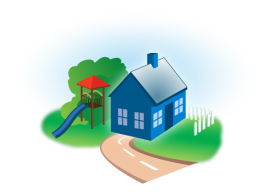
Early Childhood
Early Learning Programs
Young children (ages 1 to 5) are usually found at home, in child care, in public programs such as Early Head Start, Head Start or Georgia Pre-K, and in neighborhood preschool programs. Young children with disabilities may also be served in these settings as well as in public or private preschool programs designed specifically for children with special needs.
Early Childhood Inclusion
Policy Statement on Inclusion of Children with Disabilities in Early Childhood Programs
This policy statement, released jointly by the U.S. Departments of Education and Health and Human Services, re-affirms that all young children with disabilities should have access to high-quality inclusive early childhood programs that provide individualized and appropriate support so they can fully participate alongside their peers without disabilities and achieve their full potential.
Georgia Department of Early Care and Learning (DECAL)
DECAL promotes the inclusion of children with disabilities in early care and learning programs. Inclusive settings help children with and without disabilities and their families to have a sense of belonging, to develop positive friendships, and to develop and learn from each other. DECAL Inclusive Childcare Booklet
Head Start
Head Start and Early Head Start programs provide many different early childhood and family development services for children birth to five years old, pregnant women, and families. These high quality services are provided to encourage healthy development in low-income children and their families. In the Head Start and Early Start programs, at least 10% of the children should be children with disabilities.
Find a Head Start Location near you

Preschool Special Education
Children ages 3 through 5 who are eligible for special education services may be served by their local county schools. Your Babies Can’t Wait Service Coordinator will contact the school system before your child turns three to arrange a meeting to plan your child’s educational program. Preschool special education services can be delivered in many settings.
Steps to Success – Transition to Preschool Special Education
Private Preschool Programs
There are many private preschool options available to young children. Some of them may be specifically for children with disabilities, while other private programs are run by churches and other organizations. As you consider private preschool programs, you may want to ask if children with and without disabilities are welcome and included.
Early Learning at Home
Children do much of their learning at home. Playing with your young child is a great way to spend time together to and model play behavior and other learning skills. It is also a great way for siblings to be able to interact with a brother or sister with developmental delays.
Center for Early Literacy Learning (CELL)
CELL Practice Guides in English
CELL Practice Guides in Spanish
Bright From the Start
In Georgia, the Department of Early Care and Learning (DECAL) oversees a number of programs for young children. Also known as Bright From the Start, DECAL manages the Georgia Pre-K program, child care licensing, and nutrition programs that help to provide meals to child and adult care centers.
Find out more about Bright from the Start in Georgia
Georgia Pre-K
The Georgia Pre-K program is funded by the Georgia lottery and is open to all four-year-olds in the state. If a child is 4 by September 1st of the school year, they may attend free of charge. Pre-K slots are filled on a first come, first served basis. There is no special preference given to children with disabilities. More than 84,000 children attend Pre-K each year, but there are often waiting lists because there are limited slots available. Pre-K classes may be in private preschools or public schools.
Frequently Asked Questions about Georgia Pre-K